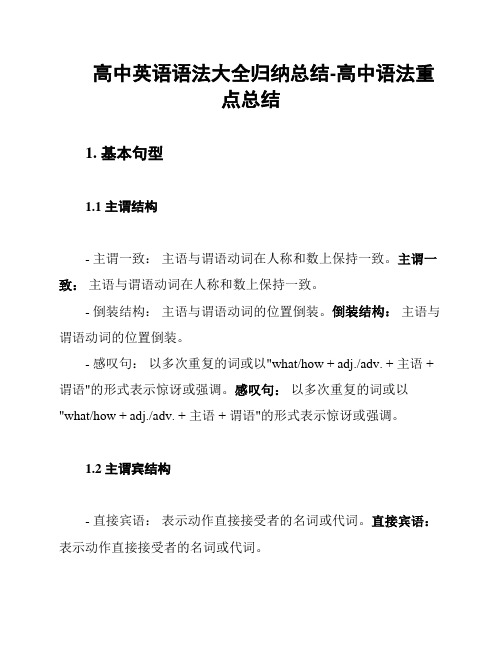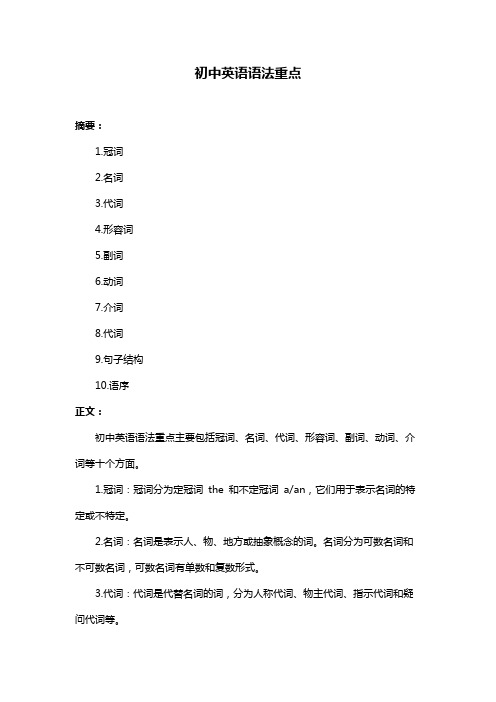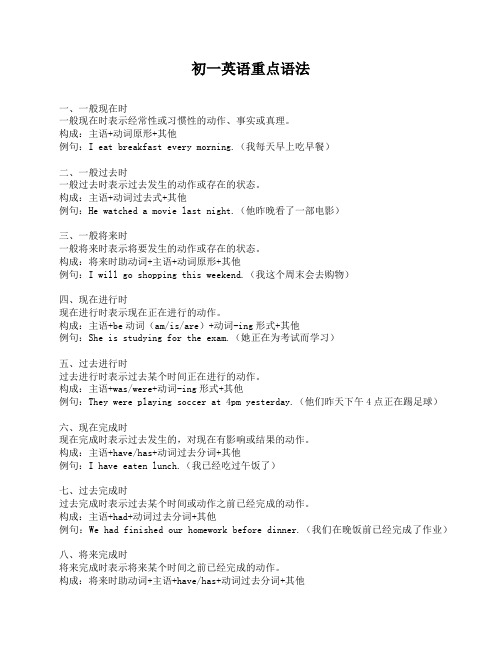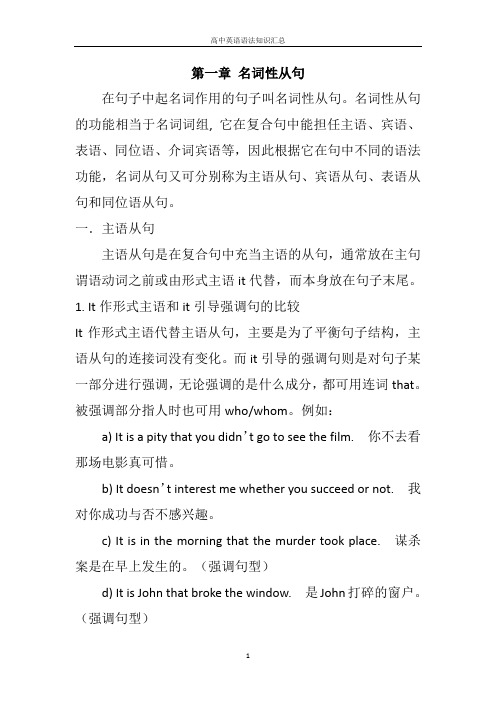英语语法重点
高中英语语法大全归纳总结-高中语法重点总结

高中英语语法大全归纳总结-高中语法重点总结1. 基本句型1.1 主谓结构- 主谓一致:主语与谓语动词在人称和数上保持一致。
主谓一致:主语与谓语动词在人称和数上保持一致。
- 倒装结构:主语与谓语动词的位置倒装。
倒装结构:主语与谓语动词的位置倒装。
- 感叹句:以多次重复的词或以"what/how + adj./adv. + 主语 + 谓语"的形式表示惊讶或强调。
感叹句:以多次重复的词或以"what/how + adj./adv. + 主语 + 谓语"的形式表示惊讶或强调。
1.2 主谓宾结构- 直接宾语:表示动作直接接受者的名词或代词。
直接宾语:表示动作直接接受者的名词或代词。
- 间接宾语:用来表示动作接受者的人或者事物。
间接宾语:用来表示动作接受者的人或者事物。
- 宾语补足语:用来修饰宾语或者补充宾语的信息。
宾语补足语:用来修饰宾语或者补充宾语的信息。
1.3 主系表结构- 系动词:用来连接主语和表语的动词。
系动词:用来连接主语和表语的动词。
- 表语:用来说明主语状态、性质、特点等的名词、形容词、副词、介词短语等。
表语:用来说明主语状态、性质、特点等的名词、形容词、副词、介词短语等。
2. 时态和语态2.1 时态- 一般现在时:表示经常性、惯性的动作或状态。
一般现在时:表示经常性、习惯性的动作或状态。
- 一般过去时:表示在过去某个时间发生的动作或状态。
一般过去时:表示在过去某个时间发生的动作或状态。
- 一般将来时:表示将来某个时间会发生的动作或状态。
一般将来时:表示将来某个时间会发生的动作或状态。
- 现在进行时:表示正在进行的动作或状态。
现在进行时:表示正在进行的动作或状态。
- 过去进行时:表示过去某个时间正在进行的动作或状态。
过去进行时:表示过去某个时间正在进行的动作或状态。
- 现在完成时:表示过去发生但对现在仍有影响的动作或状态。
现在完成时:表示过去发生但对现在仍有影响的动作或状态。
初中英语语法重点

初中英语语法重点
摘要:
1.冠词
2.名词
3.代词
4.形容词
5.副词
6.动词
7.介词
8.代词
9.句子结构
10.语序
正文:
初中英语语法重点主要包括冠词、名词、代词、形容词、副词、动词、介词等十个方面。
1.冠词:冠词分为定冠词the 和不定冠词a/an,它们用于表示名词的特定或不特定。
2.名词:名词是表示人、物、地方或抽象概念的词。
名词分为可数名词和不可数名词,可数名词有单数和复数形式。
3.代词:代词是代替名词的词,分为人称代词、物主代词、指示代词和疑问代词等。
4.形容词:形容词用于修饰名词,表示人或物的性质、特征、状态等。
形容词分为原级、比较级和最高级。
5.副词:副词是用来修饰动词、形容词、其他副词或整个句子,表示程度、方式、地点、时间等。
6.动词:动词表示动作或状态,分为及物动词和不及物动词。
动词的时态有现在时、过去时、将来时等,语态有主动语态和被动语态。
7.介词:介词用于表示名词、代词等与其他词的关系,或在句子中表示时间、地点、方向等。
8.代词:代词是代替名词、数词、形容词或副词的词,分为人称代词、物主代词、指示代词、疑问代词和反身代词等。
9.句子结构:句子结构包括主语、谓语、宾语、定语、状语和补语等成分。
10.语序:语序是指句子中词的排列顺序,英语中主要是主谓语序和主宾语序。
初中英语必须掌握的19个重点语法知识点

初中英语必须掌握的19个重点语法知识点学好语法在学校(英语学习)中至关重要。
今日,我要和大家共享的是七(八班级)必需要把握的九大语法点,助力大家英语提分!学校英语必需把握的19个重点语法学问点一、情态动词can的用法can+动词原形,它不随主语的人称和数而变化。
1. 含有can的确定句:主语+can+谓语动词的原形+其他。
2. 含有can的否定句:主语+cant+动词的原形+其他。
3. 变一般疑问句时,把can提前:Can+主语+动词原形+其他? 确定回答:Yes,主语+can。
否定回答:No,主语+cant.4. 含有can的特别疑问句:特别疑问词+can+主语+动词原形+其他?I can speak English.I cant speak English.Can you speak English? What can you speak?二、what time和when引导的特别疑问句1. 询问钟点时用what time,询问日期、月份、年份时用when。
2. Whats the time?=What time is it?现在几点了?3. 时刻表达法:顺读法和逆读法。
顺读法:“钟点+分钟”直接读数字。
如:7: 05 seven five;8:16 eight sixteen逆读法:借助介词past或to表示,要先说分再说钟点。
a. 当分钟不超过30分钟时(包括30分钟),即或=30,用past表示。
其结构为:“分钟+past+整点” 意为“几点过几分”。
如:1:25 twenty-five past oneb. 当超过30分钟时,即30,用to表示。
其结构为:“所差分钟(即60所过分钟数)+to+下一个整点”,to译成“差”,差几分钟到几点。
如:4:38 twenty-two to fivec. 当分钟为30分钟用half表示,当分钟为15分钟用a quarter。
三、how引导的特别疑问句1. how 引导的特别疑问句提问交通方式,其答语分三种状况:a. take a/an/the+交通工具(单数)b. by+交通工具(单数)c. on/in+限定词+交通工具---How do you go to school every day?---I take a bus to go to school every day./I go to school by bus every day./I go to school on the bus every day.2. how far 用来提问距离,多远,其答语分为两种:(1)用长度单位表示:It is five kilometers.(2)用时间表示:Its twenty minuteswalk.3. how long 用来提问时间,意为多久回答常用“for+段时”。
英语语法重点总结

英语语法重点总结英语是一门全球通用的语言,掌握好英语语法对于学习和运用英语非常重要。
本文将总结英语语法的一些重点内容,帮助读者更好地掌握和运用英语。
名词和代词:名词是指表示人、事、物或抽象概念的词语,代词则是用来代替名词的词语。
在英语中,名词和代词需要遵循单复数、所有格等一些基本规则。
此外,还有一些特殊的名词形式需要特别注意,如不可数名词、复合名词等。
动词时态和语态:英语动词的时态分为一般现在时、一般过去时、一般将来时等,而英语动词的语态分为主动语态和被动语态。
正确运用动词时态和语态可以准确地表达动作发生的时间和方式。
形容词和副词:形容词和副词用来修饰名词和动词。
形容词一般出现在名词前,用来描述名词的特征或性质,而副词则一般出现在动词或形容词前,用来修饰动词或形容词,表示程度、方式、时间等。
介词和连词:介词一般用来表示位置、方向、时间等关系,在句子中通常紧跟在名词或代词后面。
连词则是用来连接句子或词语,使之成为一个完整的句子。
从句和复合句:从句是一个句子中的一个分句,它可以充当名词、形容词或副词。
复合句则是由一个主句和一个或多个从句组成的句子。
正确使用从句和复合句能够使句子更加丰富和有层次感。
倒装句和强调句:倒装句是指将谓语动词提前,主语放在动词之后的句子结构。
倒装句常用于条件句、感叹句和以“否定词+助动词”开头的句子中。
强调句则是通过强调某个词或短语来突出句子中的重点,通常使用“It is/was...that...”的结构。
条件句和假设语气:条件句是由一个条件状语从句和一个结果状语从句组成的复合句。
条件句的句型有多种,如零条件句、一般条件句和虚拟条件句等。
假设语气则是用来表示假设、愿望或建议等的语气,在句子中使用虚拟语气形式来表达。
直接引语和间接引语:直接引语是指直接引用别人的原话,使用引号将其引起来。
而间接引语则是通过转述的方式来表达别人的意思,不用引号。
正确运用直接引语和间接引语可以准确传递和表达他人的意思。
初一英语重点语法

初一英语重点语法一、一般现在时一般现在时表示经常性或习惯性的动作、事实或真理。
构成:主语+动词原形+其他例句:I eat breakfast every morning.(我每天早上吃早餐)二、一般过去时一般过去时表示过去发生的动作或存在的状态。
构成:主语+动词过去式+其他例句:He watched a movie last night.(他昨晚看了一部电影)三、一般将来时一般将来时表示将要发生的动作或存在的状态。
构成:将来时助动词+主语+动词原形+其他例句:I will go shopping this weekend.(我这个周末会去购物)四、现在进行时现在进行时表示现在正在进行的动作。
构成:主语+be动词(am/is/are)+动词-ing形式+其他例句:She is studying for the exam.(她正在为考试而学习)五、过去进行时过去进行时表示过去某个时间正在进行的动作。
构成:主语+was/were+动词-ing形式+其他例句:They were playing soccer at 4pm yesterday.(他们昨天下午4点正在踢足球)六、现在完成时现在完成时表示过去发生的,对现在有影响或结果的动作。
构成:主语+have/has+动词过去分词+其他例句:I have eaten lunch.(我已经吃过午饭了)七、过去完成时过去完成时表示过去某个时间或动作之前已经完成的动作。
构成:主语+had+动词过去分词+其他例句:We had finished our homework before dinner.(我们在晚饭前已经完成了作业)八、将来完成时将来完成时表示将来某个时间之前已经完成的动作。
构成:将来时助动词+主语+have/has+动词过去分词+其他例句:He will have left for Beijing by 8am tomorrow.(他明天早上8点之前会已经出发去北京了)九、一般过去时与过去完成时的区别一般过去时表示过去某个时间发生的动作或存在的状态,而过去完成时表示过去某个时间之前已经完成的动作。
【高中英语】英语语法重点知识大汇总

第一章名词性从句在句子中起名词作用的句子叫名词性从句。
名词性从句的功能相当于名词词组, 它在复合句中能担任主语、宾语、表语、同位语、介词宾语等,因此根据它在句中不同的语法功能,名词从句又可分别称为主语从句、宾语从句、表语从句和同位语从句。
一.主语从句主语从句是在复合句中充当主语的从句,通常放在主句谓语动词之前或由形式主语it代替,而本身放在句子末尾。
1. It作形式主语和it引导强调句的比较It作形式主语代替主语从句,主要是为了平衡句子结构,主语从句的连接词没有变化。
而it引导的强调句则是对句子某一部分进行强调,无论强调的是什么成分,都可用连词that。
被强调部分指人时也可用who/whom。
例如:a) It is a pity that you didn’t go to see the film. 你不去看那场电影真可惜。
b) It doesn’t interest me whether you succeed or not.我对你成功与否不感兴趣。
c) It is in the morning that the murder took place.谋杀案是在早上发生的。
(强调句型)d) It is John that broke the window.是John打碎的窗户。
(强调句型)2. 用it作形式主语的结构(1) It is +名词+从句It is a fact that …; It is an honor that…; It is common knowledge that…(2) It is +形容词+从句It is natural that…It is strange that…(3) It is +不及物动词+从句It seems that…It happened that…It appears that…(4) It +过去分词+从句It is reported that…It has been proved that…It is said that…3. 主语从句不可位于句首的五种情况:(1)if引导的主语从句不可居于复合句句首。
初一英语语法重点归纳

初一英语语法重点归纳一、名词(Noun)名词是英语语法中最基本的词类之一,主要用来表示人、事、物、地点等名称。
名词一般分为可数名词和不可数名词两类。
1.可数名词(Countable Nouns)可数名词在句子中可用单数或复数形式出现,可与数字或数词连用。
例如:dog(狗)→ dogs(狗), one dog(一只狗)。
2.不可数名词(Uncountable Nouns)不可数名词表示抽象、物质或集体概念,一般无复数形式,无法与数字或数词连用。
例如:water(水)、tea(茶)。
二、冠词(Articles)冠词用于修饰名词,分为定冠词和不定冠词。
1.定冠词(Definite Article)定冠词是“the”,用于特指已提及的人或事物。
当再次提及同一名词时,需要使用定冠词。
例如:the boy(那个男孩)、the book(那本书)。
2.不定冠词(Indefinite Article)不定冠词有两个形式,分别是“a”和“an”,用于表示泛指或未提及的人或事物。
例如:a dog(一只狗)、an apple(一个苹果)。
三、代词(Pronouns)代词用于代替名词,根据其在句子中的作用,可以分为主格代词、宾格代词、物主代词、反身代词和指示代词等。
1.主格代词(Subjective Pronouns)主格代词用于作句子的主语,例如:I(我)、you(你)、he(他)、she (她)、it(它)。
2.宾格代词(Objective Pronouns)宾格代词用于作句子的宾语,例如:me(我)、you(你)、him(他)、her (她)、it(它)。
3.物主代词(Possessive Pronouns)物主代词用于表示所属关系,例如:mine(我的)、yours(你的)、his(他的)、hers(她的)、its(它的)。
4.反身代词(Reflexive Pronouns)反身代词用于表示动作或行为的反身,例如:myself(我自己)、yourself(你自己)、himself(他自己)、herself(她自己)、itself(它自己)。
大学英语语法重点

二、may can might could 的异同
1. May / might 事实上的可能 2. Can / could 理论上的可能
The road may be blocked. The road can be blocked. Can he tell a lie? Yes, he may. 3. Not 否定 may /might, 否定的是句子中的主动词。 They may / might not get there on time tomorrow. They can / could not get there on time tomorrow.
三、做状语 –ing/ to
1. In order to, so as to, only to, too…to.., so … as to… 2. 悬垂
Going home, mother cooked a good meal. 3. 独立主格
Weather permitting, we will go for a picnic tomorrow. 4. -ing/-ed 主动 被动
Ought to 与should 基本类似,但强调责任、义务、应该做, 或者逻辑上的必然性时用ought to
As a student you ought to study hard. I think I should try to lose some weight. It is starry tonight; it ought to be a fine day tomorrow.
3. needn’t have done Since the meeting has been canceled, they needn’t
- 1、下载文档前请自行甄别文档内容的完整性,平台不提供额外的编辑、内容补充、找答案等附加服务。
- 2、"仅部分预览"的文档,不可在线预览部分如存在完整性等问题,可反馈申请退款(可完整预览的文档不适用该条件!)。
- 3、如文档侵犯您的权益,请联系客服反馈,我们会尽快为您处理(人工客服工作时间:9:00-18:30)。
分词的形式分词作状语的用法分词短语在句子中作状语时,其逻辑主语(亦称隐含主语)必须是句子的主语.分词在句中作状语,可以表示各种不同的语义.它可以表示时间、原因、让步、结果、方式、条件等.例如:(1). 表示时间Arriving in Beijing, I found I lost my way. →When I arrived in Beijing, I found I lost my way.Seen f rom the top of the mountain, the city looks beautiful.→When the city is seen from the top of the mountain, it looks beautiful.When crossing the road, you should be careful.→When you cross the road, (you) should be careful.(2)表示原因Having lived in Guangzhou city for years, I almost know every place quite well.→Because I have lived in Guangzhou city for years, I almost know every place quite well.(3)表示结果His wife died, leaving him with three children. →His wife died so that she left him three children.(4)表示方式The poor boy stood by the door, not daring to say a word.(5)表示条件Compared with Tom, you are not diligent at all.→If you are compared with Tom, you are not diligent at all.Once losing this chance, you can’t easily find it.→Once you lose the chance, you can’t easily find it.(6)表示伴随The teacher walked into the classroom, followed by a little boy.(7)表示让步In spite of living in a city, I long for a life incountryside.→Although I live in a city, …Ex.1.The tiger escaped from the zoo, _______(create) fear and terror among the people.2.The millionaire lay on the floor in his bedroom, ______ (kill) by a murderer last night.3.If_________ (bring) up in the city, you can’t know much about farm work..4.It has been proved that once _____(deprive) of water, a man can remain alive no more than 7 days.Keys: creating, killed, brought, deprived分词作定语的用法(1)分词在句子中可以作定语时, 有两种形式,它可以放在被修饰的名词之前(称为前置定语),也可以放在被修饰的名词之后(称为后置定语).例如:We only sell used books and furniture.The girl standing behind John is Mary.(2).单个分词作定语时一般放在被修饰的名词之前;但过去分词可放在名词之后.例如:All the broken windows have been repaired.The person concerned will go there.(3)分词短语作定语时必须置于被修饰的名词之后,相当于于一个定语从句.例如:The story described in this book (=which is described in this book)is easy to understand.(4) 如果被修饰的名词是something, anything, everything, nothing等,分词放在它们的后面.例如:There is nothing interesting.(5) 现在分词与过去分词作定语的区别:a.从时态上看,现在分词表示进行,过在分词表示完成.如:the changing situation (变化中的形势) the changed situation(变化了的形势)b.从语态上看,现在分词表示主动,过在分词表示被动.如:the exploiting class (剥削阶级) the exploited class (被剥削阶级) Ex.1. Thousands of products (make) ______ from crude oil are now in daily use.2.At the international conference, the famous scientist gave an excellent report (base) _____ on his recent experiment.3. The first textbooks (write) ________ for teaching English as a foreign language came out in the 16th century.Keys: made, based, written定语从句定语从句的引导词分为关系代词和关系副词.关代词有who, whom, whose, which, that, as, but关系副词有when, where, why, as.I.关系代词(1) who: 代替人,作从句的主语A man who smokes a lot may not live a long life. →a.A man may not live a long life.b. A man smokes a lot.2.whom:代替人,作从句的宾语The workers whom you met yesterdy were building houses for themselves. →a. The workers were building houses for themselves.b. Y ou met the workers yesterday.3.whose: 代替人或物,作从句的定语Betty, whose twin sister also studies in our college, will come to the party. →a. Betty will come to the party.b. Betty’s twin sister also studies in our college.The classroom, whose windows are painted green, is ours. →• a. The classroom is ours.• b. The classroom’s windows are painted green.4. which:代替物,作从句的主语,宾语,可以引导限定性和非限定定语从句5. that :代替人或物,作从句的主语,宾语,只能引导限定性定语从句Any person that is interested in the activity can join the club.6. as:代替人或物,常与same, such连用,引导限性定语从句;单独使用引导非限定性定语从句This is the same as I bought last week.As is known to all, China is a developing country.(As修饰整个主句,在从句中作主语)She was absent, as (which) is often the case.Tom had an argument with Bill, ____is known to all. (Answer: which/as)____ was natural, he married her. (Answer: As)7. but:表示否定意义,代替人或物There is no one of us but (= who…not ) wishes to go. (没有人不想去.)There is no one in the world but knows that the sun is bigger than the moon.(世上没有人不知道太阳比月亮大.)•II.关系副词1. when: 先行词是表示时间的词, when在从句中作状语He still remembers that day when he first went to college. →a. He still remembers that day.• b. He first went to college that day.Cf. He still remembers that day which (that) he spent with his girlfriend. →a. He still remembers that day.b. He spent that day with his girlfriend2.where:先行词是表示地点的词, where在从句中作状语This is the small town where I was born. →a.This is the small town.b.I was born in the small town.Cf. This is the small town which I visited last year. →a.This is the small town.b.I visited the small town last year.3.why:先行词是reason, why在从句中作状语The reason why he didn’t come is not very convincing.4.as:先行词是作状语的词, as在从句中作状语I shall use the computer in such way as he used it yesterday.III.如果先行词是all, much, anything, something, nothing, everything, little, none等不定代词,关系代词一般只能用that.There is little (that) we can do about it.IV.如果先行词被形容词最高级以及first, last, any few, much, no, only,some, very等词修饰,关系代词只能用that,不用which, who或whomShe is the only person that was invited to make a speech at the meeting.V. 如果有两个或两个以上既指人又指物的先行词,关系代词用thatThe well-known poet and his works that we have just discussed aroused great interest among the students.VI. 介词后面的关系代词只能用which或whom不能用that 或who•The man with whom she worked was a bit strange.•This is the film about which we are talking.虚拟语气2.省略If的条件状语从句中的虚拟语气(用倒装)当条件状语从句中出现were, should, had等时,可以将if省略,把were, should, had放在主语的前面.e.g. If he had worked harder, he would have passed the final exam. →Had he worked harder, he would have passed the final exam.3.固定句式中的虚拟语气(1) demand, suggest, advise, propose等词引导的宾语从句中;•I suggested that she (should) finish the work tomorrow. (宾语从句)•advise, argue, beg, command, recommend decide ,demand, determine, intend, insist, maintain, move, order, propose, request, require, resolve, prefer, etc.(2) It + be +suggested/demanded + that引导的主语从句中;It is suggested that she (should) finish the work tomorrow.(3)suggestion,proposal等词引导的同位语从句中•His suggestion has been turned down that we should invite our parents to our party.•advice, decision, demand, desire, motion, necessity, plan, preference, proposal, recommendation, resolution, requirement(4) It is/was +adj. + that 从句后用should) +动词原形It was ridiculous that he should behave that way yesterday. (他昨天的行为真是可笑之极.) advisable, appropriate, crucial, critical, decisive, desirable, eager, essential, imperative, impossible, incredible, natural, necessary, odd, proper, ridiculous, surprising, strange, urgent ,vital•(5) for fear that/lest (惟恐),引导的从句中.• E.g. He didn’t dare to leave the house lest someone should recognize him.•以上从句中的谓语动词由should +动词原形构成,should可以省略.(6) as if (though) 如果与现在事实相反谓语动词用过•wish +从句时去式, 如果与过去事实相反,谓语动•would rather, 词用过去完成式•if only (要是…该多好啊!)He treats me as if I were a stranger.I wish you had told me the news yesterday.•If only he had known that the disease was curable!•I would rather he painted the door green.(7).It’s high/about time +从句时,谓语动词只用过去式•It’s high/about time he went to bed.(8).介词短语可相当于一个条件状语从句时要用虚拟语气,如without, but for, otherwise•But for the heavy rain, we would have been there in time.(9). should/could/might/would +have + -ed•表示过去应该或打算做而没有付诸实施的行为.•Y ou should have come here yesterday.•Mr. Smith would have come to help us, but he was very busy then.•Cf. Mr. Smith would have come to help us, if he hadn’t been busy then.•I (buy) ______ the dictionary, but I was short of money that day.•Answer: would have bought•If you hadn’t watched that late movie last night, you (not be) ________ sleepy now.•Answer: wouldn’t be同位语从句•用连词that, whether以及连接代词who, which, what 和连接副词how, when, where, why等引导从句作同位语,称为同位语从句.在同位语从句中that虽不作任何句子成分,且无意义,但不可省略.同位语从句常对与之同位的名词中心词作进一部的解释和说明,能接同位语从句的常见名词有: belief, conclusion, decision, discovery, explanation, doubt, fact, feeling, hope, idea, message, news, opinion, possibility, problem, proposal, question, reply, report, remark, statement, thought, truth, information, word, understanding.1. An idea occurred to him_______ he might borrow this book from his mother.A. thatB. whichC. whatD. where2.I have no idea _______ our team will win the match.A. whetherB. thatC. whatD. if3. I have no idea __________.A. how long they are comingB. how soon they are comingC. how soon will they comeD. how long will they come4. Word (news) came ______ another power station would be ready in our hometown.A. whichB. whatC. thatD. when5. The suggestion that the mayor ______ the prizes was accepted by everyone.A. would presentB. presentC. presentsD. ought to present6. They are faced with the problem ______ continue the project.A. if they shouldB. that they shouldC. whether should theyD. whether they shouldCf.7. They are faced with the problem ______ has been discussed at the meeting.A. whichB. whatC. whetherD. whenKeys: A, A,B, C, B, D,A独立主格结构(the absolute struture)1.The National Day Holiday__________over, we must now get down to school.A. beB. beingC. isD. are key: B2.The National Day Holiday__________over and we must now get down to school.A. beB. beingC. isD. are key: C所谓独立主格结构,实质上是带有自己主语分句.按其结构形式来分,可分为不定式独立主格结构,-ing分词独立主格结构,-ed分词独立主格结构.这些结构通常在句中作状语.独立主格结构与主句之间不能有任何连接词.例如:The work having been finished, they had a rest.Time permitting, we will fly to Shanghai.(1). “不定式独立主格结构”表示即将发生的动作.The two parties should first reach an agreement on the basic principle, the details to be worked later.2)“-ing分词独立主格结构”则表示正在进行的动作,且主语与“-ing分词之间为主动关系.The meeting being over, the students had a heated discussion.Darkness setting in, the young people(3). “-ed分词独立主格结构”表示已经发生的动作,且主语与-ed分词之间为被动关系.All our savings gone, we had to start looking for jobs.All flights having been canceled, we decided to stay here for another week.1.All things (consider)__________, her invention is of greater value than yours.2.He stood there, his eyes (look)_______ straightly into the blue sky.3. There are various kinds of metals, each (have)_________ its own properties.4. Ford tried dividing the labor, each worker (assign)________ a separate task..Keys: considered, looking, having, assigned,。
